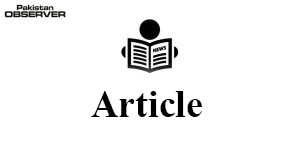The expose of corruption under PTI
IT’S never been easy to rule Pakistan. From neutral observers such as Anatol Lieven to local authors like Ishrat Hussain, a number of writers have pointed out in their books the intricate issues with the country. It was the PM who stood tall and took the onus on his shoulders to right the wrongs.
Starting with populist claims of fixing the top-down corruption in 90 days to rooting out corruption in six months, the PM bandied about these endemic and deeply entrenched issues like he had Aladin’s lamp.
The uninformed people, who had tried the two family dynasties for decades, gave Mr. Khan a try, considering his enviable track record. Of course, the blessings of the spatial creature need no mention—even unborn babies in Pakistan know about them.
Although Mr. Khan became the PM, his marriage with ground realities brought to light many things: first, despite his 23 years of struggle, he was as naive as Bilawal—to put it bluntly—in governance. Indeed, his desperation found no boundaries when one takes a look at his speeches, protests, press conferences before 2018.
Third, he was duped by his team about which his praises were saturated, only to get lukewarm once they came out of the fictional world.
After three years of misgovernance, everything has become crystal clear. The report that came on 25 January of the Transparency International seems the last nail in the coffin of corruption-laden populism.
Given that inflation is going through the roof, terrorist attacks are gearing up and the opposition is blamed for all the ills of Pakistan, the people of Pakistan knew it yonks ago, this report however attested to the situation.
The PTI came to power on one big claim: rooting out corruption. In other words, had there been no corruption or less corruption in Pakistan, there wouldn’t have been any PTI or Imran Khan in power. The irony is that those corrupt whom our PM blames every day boded well.
For instance, in 2018, the report said, Pakistan was ranked 117 out of 180 countries; however, today it is as low as 140 out of 180, lo and beholds—23 spots deterioration in three years. Pakistan’s points are 28 whereas India’s are 40 out of 100.
The report further sheds some light on the reason behind this cataclysm. In the last ten years, the report maintains, there have been ‘mass movements calling actions against corruption, but sadly little has changed’.
The outrage of people ‘has instead co-opted’ by ‘populist leaders in democratic countries and authoritarians elsewhere’. The rise of Imran Khan goes back to 2011 and it exactly started 10 years ago. There has been much fanfare, but nothing of significance has come to light.
Needless to say, populism has totally destroyed any chance of improvement by giving simplistic answers to complex questions like governance, thanks to our leaders. To root out corruption, the report mentions certain steps. What stands out is institution building.
What the National Accountability Bureau (NAB) has been doing for the last three years vitiated any trust in the whole institution. Rather than making NAB independent and functioning, the incumbent has used it for the political witch hunt.
The party in power let lose corruption for its bootlickers—closed for others. As a result, Pakistan has progressed in corruption.
Transparent election and ‘voter education’ are two other ingredients to contain corruption. As regards free and fair election, one only has to read the report of the ECP on the Daska Election to see how the incumbent used all manoeuvres to win the seat.
As for voter education, the only talent our politicians have is blame-game, which makes not only politics polarized but a dirty business as well.
Unless Pakistan doesn’t come out of the clutches of anti-democratic forces, all claims of governance, democracy, or vote bear no relevance. The earlier we understand it, the better. Another aspect of the report deals with the ‘protection of human rights to put an end to systemic corruption.
Freedom of speech, expression, and especially media freedom is the linchpin of the report. Unfortunately, those journalists who don’t toe the government’s line are killed, attacked, intimidated. Many attempts had been made in the past to gag the media.
While social media gives a little bit of space to some independent thinkers, our autocratic tsars leave no stone unturned to silence them by carrot and stick.
The fact is that the problems of Pakistan can’t be solved so easily—a bitter pill to swallow. Our rulers should divorce a Roland-for-an-Oliver approach and educate people on the issues at hand.
For more than seven decades, our leaders have been gimmicking about our issues. There should be no more experimentation with neither the economy nor the system of democracy—only to get back to square one.
Radical change will and should only come from a radical change in education, economy, democracy and foreign policy within the framework of the constitution. Of course, corruption is the biggest issue. But the solution doesn’t lie in simplistic claims.
Even a country like Norway, Sweden or any other country doesn’t have 100 corrupt-free societies. Those who have less corruption have strong institutions, which even make their PMs and Presidents accountable.
—The writer is contributing columnist.










